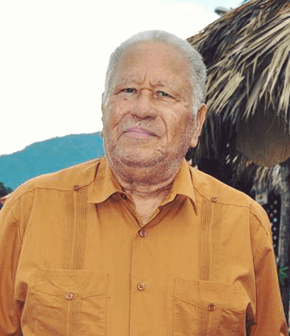Henri Namphy facts for kids
Quick facts for kids
Henri Namphy
|
|
|---|---|
 |
|
| 36th President of Haiti | |
| In office 20 June 1988 – 17 September 1988 |
|
| Preceded by | Leslie Manigat |
| Succeeded by | Prosper Avril |
| In office 7 February 1986 – 7 February 1988 (Provisional) |
|
| Preceded by | Jean-Claude Duvalier |
| Succeeded by | Leslie Manigat |
| Commander-in-chief of the Armed Forces of Haiti | |
| In office 4 November 1987 – 17 June 1988 |
|
| President | Himself Leslie Manigat |
| Preceded by | Himself (as Chief of the General Staff of the Army) |
| Succeeded by | Morton Gousse (Interim) |
| Chief of the General Staff of the Army | |
| In office 23 March 1984 – 4 November 1987 |
|
| President | Jean-Claude Duvalier Himself |
| Preceded by | Roger Saint-Albin |
| Succeeded by | Himself (as Commander-in-chief of the Armed Forces of Haiti) |
| Personal details | |
| Born | 2 October 1932 Cap-Haïtien, Haiti |
| Died | 26 June 2018 (aged 85) Dominican Republic |
| Resting place | Cristo Redentor cemetery, Santo Domingo |
| Spouses | Gisèle Célestin, Therese Gabrielle Célestin, Altagracia Marte |
| Relations | Elisabeth Delatour Préval (niece) |
| Children | 2 |
| Residences | Jarabacoa, Dominican Republic |
Henri Namphy (born October 2, 1932 – died June 26, 2018) was a Haitian general and an important political figure. He served as the leader of Haiti's temporary government, called the National Council of Government. This was from February 7, 1986, to February 7, 1988. He became President of Haiti again on June 20, 1988, after a military takeover he led. He was removed from power on September 17, 1988, in another military takeover.
Contents
Henri Namphy: A Leader in Haiti
Henri Namphy played a key role in Haiti's history during a time of big changes. He was a military general who stepped into politics when the country was looking for new leadership.
Taking Charge of the Government
After Jean-Claude Duvalier, who was known as the "President-for-Life," left Haiti in 1986, Lieutenant General Namphy became the head of a new temporary government. This group was called the National Council of Government. It had six members, both civilians and military leaders. They promised to hold elections and bring democratic changes to Haiti. People sometimes called his government "duvalierism without Duvalier." This meant it seemed like the old ways were still there, even without Duvalier himself.
Facing Challenges and Changes
At first, many people thought General Namphy was honest and not involved in politics. However, his time in power was difficult. After Duvalier left, Haitians stopped celebrating and began to protest and take things from stores.
In March 1986, there was a lot of unrest in the capital city, Port-au-Prince. The popular justice minister left the ruling council. Namphy then removed three other members who had close ties to the old Duvalier government. The new council had only two other members besides Namphy. It was hard for the council to keep control because of many strikes and protests.
Elections and Changes in Power
In October, an election was held to choose people to write a new constitution. However, not many people seemed interested in helping to decide Haiti's political future.
The first attempt to hold a presidential election was in November 1987. This election ended in tragedy when many voters were killed.
In January 1988, Leslie Manigat won an election that many people believed was not fair. On June 20, Namphy removed Manigat from power in a military takeover. This happened after Manigat had tried to remove Namphy as the army commander. Namphy stayed in power until September 17, 1988. At that time, a group of younger officers, led by General Prosper Avril, removed him from power.
Later Life and Legacy
After being removed from power, Henri Namphy lived in another country, the Dominican Republic, for 30 years. He passed away on June 26, 2018, from lung cancer. He had told his family he wanted to be buried in the Dominican Republic. In his will, he gave his personal library to the Fundación Global Democracia y Desarrollo foundation.
Namphy could speak four languages: Haitian Creole, French, Spanish, and English. He was married twice and had two daughters. One daughter lives in Martinique, and the other lives in the Dominican Republic.
See also

- In Spanish: Henri Namphy para niños

